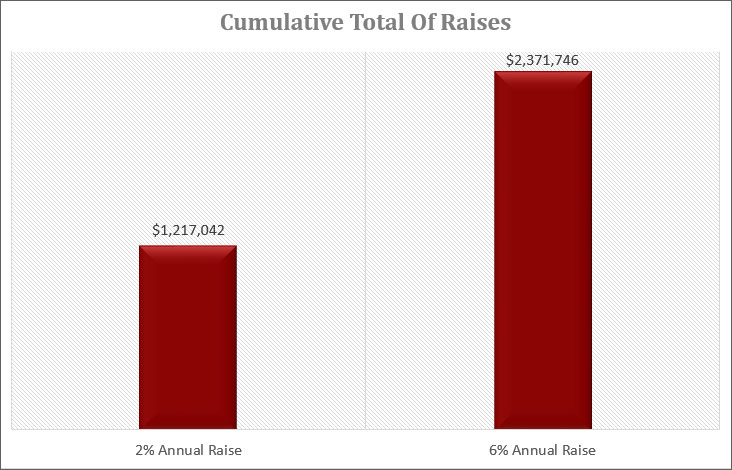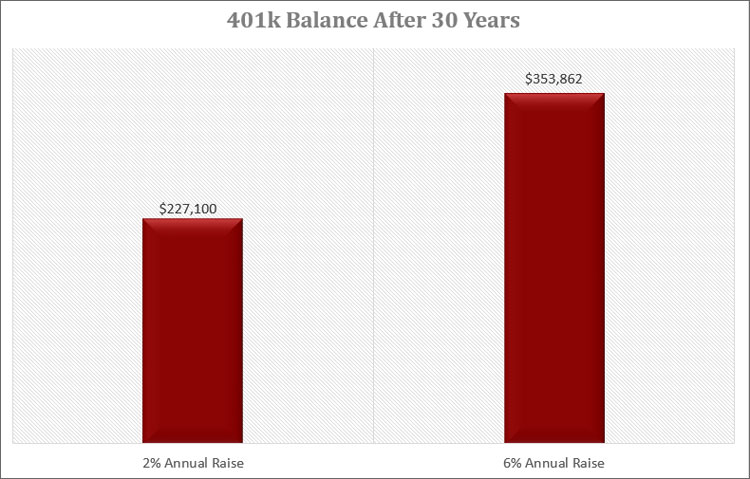THIS POST MAY CONTAIN AFFILIATE LINKS. PLEASE SEE MY DISCLOSURES. FOR MORE INFORMATION.

Maybe you do get a raise but it is only a minuscule 2% cost-of-living adjustment every year.
Do you want to know how to earn a raise?
Maybe you want to get bigger raises, have a fatter paycheck, and swim in a vault of money like Scrooge McDuck?
If so, here are 4 tips forgetting a raise year after year at work and becoming filthy rich in the process.
How do I know they work?
Because they are the tricks I used to earn an average annual salary increase of 5%.
I am confident that if you apply these tips to your career, you too will be able to see larger than average raises and grow your wealth.
Table of Contents
4 Tips For How To Earn A Raise
#1. Become Valuable
The #1 way to earn a raise at work is to become valuable.
What does this mean? It means doing things for the company that no one else will do.
The first step in this process is to become a ‘yes’ person.
Whenever your boss asks you to do something, your answer is yes. Whenever a project is presented and they are looking for volunteers to help, your answer is yes you can help.
Doing this will show your boss that you are a go-getter and someone who can be relied on when something comes up.
Another step in this process is to make your bosses life easier.
The next time you are in your bosses office, make a note of any work you can take on.
Maybe it’s the TPS reports. Maybe it’s the quarterly newsletter.
Whatever it might be, there is probably something they hate doing. Your job is to figure out what that is and take ownership of it.
Some of you might be thinking, “I have no idea how to complete the TPS report or write the quarterly newsletter.”
If this is the case, then you need to learn how to do these things. Ask questions. I’m sure there is someone at your office that has an understanding of how to complete the reports.
In the event that no one does, then tell your boss you’d love to take that work off their hands, you’ll only need 20 minutes of their time to be shown how to ensure the task is done correctly.
My boss was more than happy to take the time to show me how to complete a certain spreadsheet, because he knew after that he wouldn’t have to deal with it again.
Of course, there are some things that no matter how much your boss dislikes doing them, you are not qualified to take off their hands.
Luckily, there are a few other ways to become valuable at work as well.
This leads us to finding ways to save the company money. The best way to do this is to pay attention and ask questions.
Many times you will find cutting waste to be your best route.
Can you switch to better yielding ink cartridges for the printer? Can you find a lower-cost paper to use?
Maybe start printing double-sided more often, scan versus print, or even print in black more than color? What about changing the settings on the fax machine so that you stop receiving spam?
Maybe you can set up everyone’s computer to go into sleep mode or have your co-workers turn off their computers at night?
This is just the tip of the iceberg when it comes to cutting costs.
Maybe you found a software program that will make certain tasks more efficient. While it does cost money, figure out how much time it will free up.
The less time certain tasks take, the more time everyone has for other tasks.
Here is a great list of ideas to get you thinking about ways to help your company save money.
The idea is to show that you have an ownership mentality in the company, and that you are also looking for ways to increase the bottom line.
The more things you do to show your value to the company, the greater the chances of you getting a raise year after year.
#2. Constantly Look For Ways To Be More Efficient
If you are taking on your boss’ work and finding ways to save the company money, you might be thinking you are going to have to come in early and stay late every day.
This is only the case if you can’t find ways to work smarter. Put some effort into seeing if there are smarter ways to get certain jobs done.
Don’t believe that things at work are done a certain way for a reason.
Most times things are done certain ways because it worked at the time and no one has questioned it since.
At my old firm, every end of quarter we each had duties assigned to us.
My most important duty couldn’t be completed until I had the information from my colleague. The problem was that her job of getting me that information was the least important thing for her to complete.
So, I took it from her.
It wasn’t a ton of work, but it allowed me to get my quarterly duties completed much quicker.
In fact, before the change, I would turn in my assignments around the 15th of the month. After the change, I had my work done on the 6th, all because I didn’t have to wait around.
With my duties done earlier, the next person was able to get his work completed sooner as well.
The ultimate result was that clients were getting their quarterly reports almost 2 weeks sooner than before.
This made them happier clients. And while we couldn’t attribute the reports to a better bottom line, the truth is it didn’t hurt.
In another instance, we would scan documents on the copier and they would go into a general file folder with an arbitrary file name.
We would then have to go back to our desk, open the folder where the files were, and try to figure out which ones belonged to whom since there were many files in the folder.
Then we would have to rename the scanned file and attach it into an email message before sending it out.
A colleague took 15 minutes and changed a setting on the copier so that scanned documents would go to a folder created for that user.
Then we figured out how to change the default file name so there was less time spent renaming files.
It sounds small, but it saved us a few minutes every time we sent an email with a scanned document.
Always look for ways to be more efficient, either processes for yourself or your company.
You don’t have to be the first one in the office every morning and the last one to leave. You just have to figure how to work smarter so you can get more done in the time you have.
Just don’t leave early or show up late everyday, otherwise people will think you don’t have enough work to do!
#3. Document, Document, Document
All the work you take off your bosses hands and all of the new solutions you identify to work smarter and not harder needs to be documented.
Take detailed notes and records. Don’t just list the things you did, but elaborate on the impact they had.
Write down how much time was saved by doing the process differently. Write down all of the benefits you can think of. This will help you in the next tip.
If you have trouble coming up with ways the solution helped out, ask your co-workers how the change has helped them.
If you can quantify, into numbers, how much the changes saved the company in dollar terms, make note of this as well.
The reason you need to document things is because no one else is doing it and in fact, most times, people quickly forget.
Don’t assume that your boss remembers everything you did for her, she may not have even been aware of the change you implemented.
Be certain she will know because of the detailed notes you keep. This is a key point in how to get ahead at work.
If your company keeps statistics on you, be sure you review them on a regular basis and see how you compare to others.
You aren’t looking for each of your co-workers statistics, but the group as a whole.
At my first job out of college, we had a monthly review where I saw my numbers compared to the group average.
Every month I produced more work with fewer errors than my co-workers.
As a result of having this information, I made sure to use it when I asked for a larger raise.
I had concrete proof as to why I deserved a higher raise than the group average.
#4. Schedule A Meeting Before Your Review
The biggest mistake most employees make is not asking for a raise.
The second biggest mistake they make is waiting for their annual review to find out their raise.
When they get into the meeting and hear they are only getting 2%, they try to justify why they deserve more.
Unfortunately, this rarely works out for them.
This is because by the time their annual review comes, next year’s budget is already set. There is very little your boss can do to change the numbers.
The solution to this is to schedule a meeting 6 months before your annual review.
In this review, ask for feedback on your performance. This gives you a better idea of how you are doing and where you still need to improve.
Also, ask what the company is thinking in terms of raises for the year.
Try your best to get a number from your boss, but don’t be a pest.
After you get a number, even if it is a rough estimate, ask for a raise that you think is fair for yourself and show your documentation as back up.
Show them how important you are to the firm. You can’t just say I deserve a 10% raise without any reason why.
With that said, you also have to ask for a number within reason.
You can’t walk in and ask for 50%. Be reasonable and be fair.
I usually shoot for something in the 5-10% range. The goal here isn’t to get a confirmation from your boss.
It is simply to show them how much you bring to the table, that you want a larger raise, and why you should get that larger raise.
One more thing about asking for a larger raise, make sure you have a good idea of how the company is doing in general.
If they just laid-off a bunch of employees or are struggling financially, you will have a tough time getting a larger raise.
Some reading this might be nervous to approach their boss and ask for a raise.
This is completely understandable. To make the conversation easier and to improve your chances of getting what you want, practice beforehand.
Sit down with a friend or your spouse and role play. Have them act as your boss and try to come up with reasons for not giving you a raise based on the information you provide them.
Do this role play a few times so you can get comfortable asking for a raise, and so you can have answers if your boss comes up with reasons why you shouldn’t get one.
Your Annual Review
This is the moment of truth, whether or not you got your higher raise or not. If you did, great!
This doesn’t mean you can slack off though. You have to keep up the hard work and keep showing your firm that you are valuable.
If you don’t keep up the hard work, then the next time you go in asking for a bigger raise, they will call you out on how you slacked off the last time you received a bigger raise.
In the event you didn’t get your higher raise, ask why.
Does the company not see the value you bring? Is the company in a hardship and cannot afford to give a larger raise? You need to know the answer so you can come up with a plan.
That plan could include everything from working just as hard the following year and then getting the raise because the company is stronger financially, to looking for employment elsewhere, or starting your own business because your firm just doesn’t value employees.
Whatever you do, make it a point to take notes as to the reason why and then sit on it for a week or two.
We never make a good decision when we are emotional. Let everything calm down before you create your plan for your next step.
If that next step turns out to be you staying with the firm, then schedule another meeting with your boss and talk about how you worked hard and were disappointed with your lack of a raise.
Then ask what more you can do or what you can do differently in order to earn a larger raise.
If, on the other hand, the next step turns out to be looking elsewhere, now is the time to dust off your resume.
Luckily, you have documented all of the ways you increased savings for the firm so you can include them on your resume as tangible things you accomplished.
If you decide that you want to be your own boss, you need to make sure you have an idea of what you want to do and know how much money you will need to save before you do anything.
The last thing you want to do is lose a steady paycheck when you have a family to support and no savings.
You also want to make sure you update your LinkedIn profile with an updated set of skills and job description as well.
But before you do this, make sure you have your settings set not to send a notification to your connections about the edits you made.
If you are connected with your boss or others in your company, this could raise a red flag that you are thinking of leaving.
What To Do If You Work Where You Cannot Negotiate Your Raise
For some people, you work in a place where you cannot actively earn a raise. You are stuck with the same raise every year. What are you to do?
Your best option is to regularly sit down with your boss and talk about projects and committees that you would help out with.
Your goal in doing this is to get more qualifications so you can move up in pay level with a promotion.
At the very least, having more experience will also allow you to wow potential employers if you choose to leave your company for another.
And if you decide to leave your employer for a better situation, make sure you negotiate your starting salary.
By making sure you get the highest starting salary you can, it will greatly compound your earnings over time.
The Case For Getting A Raise To Become Filthy Rich
Now we get to the good part, showing you how your hard work and earning a raise will pay off financially.
Let’s say you are earning $35,000 annually and you do just enough work to get by and secure a 2% cost of living raise every year.
Over the course of 30 years, your salary will increase to $62,155. Not too shabby.
If, on the other hand, you secure a 6% raise every year, over the next 30 years your salary will increase to $189,644.
That is over $125,000 more!
Now we are talking! Below is the difference of your annual salaries.
But those numbers are just your annual salary amounts.
What is the cumulative amount of your annual raises combined?
With a 2% annual raise, your total lifetime earnings are $1,217,042.
If you get a 6% annual raise instead, your total lifetime earnings are $2,371,746.
If you can secure a 6% raise, which is not out of the question, you come close to doubling your lifetime earnings. If this doesn’t motivate you, I don’t know what will.
The Effect Of Larger Raises On Your Savings
Now let’s look at the impact of a larger raise on your savings.
For this, we will assume you are earning $30,000 a year, saving 5% in your 401k plan at work annually, and that money grows 8% each year for 30 years.
To keep things simple, we will assume there is no employer match.
Here is what your ending 401k plan balance looks like after 30 years.
At the end of the day, getting a 6% raise makes a big difference and could be the deciding factor in you retiring early or working until 65 or longer.
Finally, some readers might mention that each job has a ceiling as to how much you can earn.
There is no way a $30,000 per year job is going to let you earn close to $200,000 a year.
I understand this point but wanted to show how getting a higher than normal annual raise pays off.
Odds are you won’t be in the same position in 30 years. Odds are you will be at another firm or will have been promoted into a position that does allow for a higher salary.
In both cases, those are opportunities for raises.
Final Thoughts
There you have the steps to getting a raise at work.
The steps are simple to follow. You just have to put in the effort. And the effort is more than worth it.
While a 2% annual raise doesn’t sound too bad, you have to remember that inflation averages between 2-3% annually.
This means if you get a 2-3% raise each year, you aren’t ever going to get ahead financially.
This is because the price of the things you buy are also increasing by this same 2-3%. So as the years pass, you will continue to just tread water.
The money is out there, you just have to show that you are worth getting it.
Step outside of your comfort zone, start thinking outside the box, and make the effort to show how valuable you are so you can get a larger raise.
Remember, if you don’t ask for a raise, the answer is always no. So make sure you ask. You may be surprised at the outcome.
I have over 15 years experience in the financial services industry and 20 years investing in the stock market. I have both my undergrad and graduate degrees in Finance, and am FINRA Series 65 licensed and have a Certificate in Financial Planning.
Visit my About Me page to learn more about me and why I am your trusted personal finance expert.







Tip #2 is one of my favorites! I have always said to work smarter not harder and if you are a hard worker who is working smart, the possibilities are endless! You should be an asset, not an employee!
I love it – be an asset not an employee!
Am not sure where I read this quote, goes something like this: The extra mile is uncharted territory, when you walk there you realize just how few people if any have been there despite all their talk of walking that extra mile. You want to get ahead at work and become filthy rich, walk that proverbial extra mile with your tasks 🙂
Awesome quote! Thanks for sharing!
Totally agree with working smarter not harder. I’m going to be sure to get things done very well and early. Crushing deadlines is one of the biggest assets in my world – so many people are last-minute folks that getting work done early is seen as a huge, huge plus.
I always made it a point to get my work done before the deadline. It allowed me to move onto other things which sometimes brought on new ideas for the other project I was working on. I then had the time to change or update things if I felt the update was important enough.
#4 is critical – if you want a big raise, give your manager a heads up well before your review meeting. At most large companies, the review process is 2-3 months, so 6 months is too early since your manager won’t know how much money he has available. If you know your review is in April every year, make sure you sit down with your boss in February and go over your accomplishments and ask for your big raise. If you wait until review time, it’s too late. The numbers have already been reviewed and approved, and any material change is very very difficult.
The other caveat for all of this, make sure you have a good boss. A good boss will recognize your value and reward you. A bad boss will take credit for your work, speak poorly of you to superiors, and completely stall your career and kill your morale. Give your boss one year – if you do great work and don’t get a great reward, go somewhere else. It doesn’t have to be a new company, but it has to be a new boss.
Excellent tips Jack! Thanks for sharing them!
The Canadian economy has been slumping as of late so even if you’re an all star employee there’s no guarantee you’ll get a raise beyond the cost of living. If you’re willing to keep jumping companies you can advance your pay faster but sometimes a little bit of stability is good.
You definitely have to take into account the financials of your company and the economy. Back in 2007-2008 in the US odds were slim you could get a 5% or more raise.
Jumping companies is an option to quickly increase your salary, but caution needs to be done here too as too much jumping might make some employers hesitant to take you on.
I work for a small company. I’m the only daytime person fielding emails. Before he hired me, my boss was doing my job. So he definitely lets me know how invaluable I am with a raise each year.
Granted, in a small company it’s easier to share the wealth. But in big business you also have more room for growth. Even if you don’t get huge raises, getting noticed may put you on the list for a promotion.
The best way really is to find out what the boss or company needs and offer your services. I’ll see things that need to do and email my boss. He okays my working extra hours to get it done. It also lets him know that I have the company’s best interests in mind. Even in a big company, that’s what will make the difference when it comes to raises and promotions.
Great job!! Working for a small company definitely has its benefits. The key as you said is to find a need and fill it!
Cool article here Jon, completely agree on being proactive and making yourself invaluable as a result of this!
What are your thoughts on moving companies as a way to increase wages, if the raises aren’t forthcoming?
I don’t see an issue changing jobs as long as it is done smartly. You can’t change jobs every year. Well, at first you might be able to do this, but eventually, employers will get nervous hiring you because they might fear you will just jump ship within a year. So you have to be smart when moving around.
To sum up, just be at your best at all times, Jon. This is what I always do so that when a need comes up such as asking for a raise, my boss knows that I deserve it. And I always look for ways to make sure that I work efficiently like reading people’s experiences and know some strategy that fits my needs.
I agree 100%!